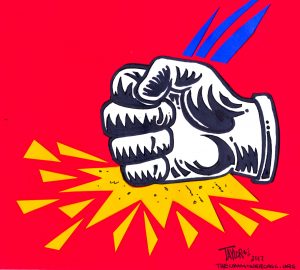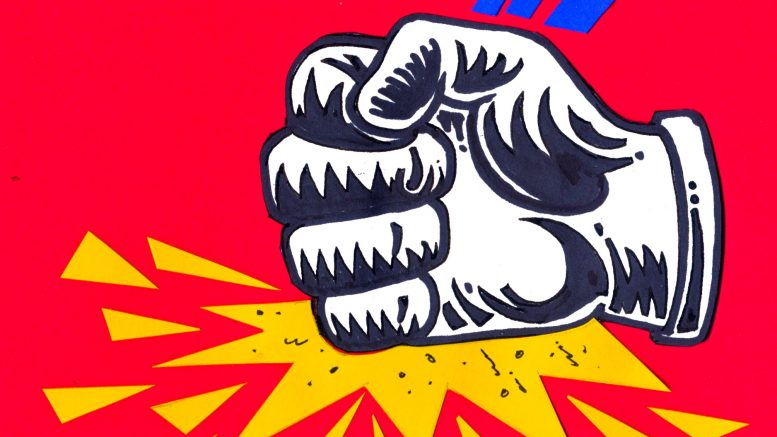
When Vietnam came home.
By Clara Bingham
The Guardian (7/6/19)
On 4 May 1970, the Ohio national guard shot at hundreds of students protesting against the invasion of Cambodia, wounding eight and killing four. Kent State was seared into the national consciousness. The US government had authorized the killing of its own (white) children.
But what many might not know is that a year earlier in Berkeley, California, police opened fire with buck and bird shot on a large crowd of young protesters seeking to keep open People’s Park, an impromptu community garden on land UC Berkeley wanted to use. Fifty people were hit.
“If it takes a bloodbath, let’s get it over with, no more appeasement.” — Ronald Reagan
James Rector, a 25-year-old visitor from San Jose, was killed. Alan Blanchard was blinded. Donovan Rundle was shot point blank in the stomach and almost bled to death. After two dozen surgeries, he would live with chronic pain for the next 50 years.
“Bloody Thursday”, 15 May 1969, was the day the Vietnam war came home. The streets of Bohemian Berkeley, the New Left’s west coast HQ, became a bloody war zone. Martial law was declared, a curfew imposed and national guardsmen with unsheathed bayonets and live ammunition occupied the town. A military helicopter doused the campus with tear gas. Many members of the Alameda county sheriff’s department had just come home from Vietnam. Some later admitted that they treated antiwar students like Viet Cong. …
*****
Hell No: Celebration Of Vietnam Protests Can Inform Today’s Needed Resistance To Trump
“The cycle of war continues its familiar path. Truth, it is said, is war’s first casualty. Memory is second.”
By Clara Bingham
The Guardian (2/12/17)
Tom Hayden’s death, in late October at the age of 76, could not have been more untimely. The 60s protest leader missed by just three months the dawn of a new US mass movement, the likes of which we have not seen since Hayden led the charge against the Johnson and Nixon administrations’ relentless escalation of the Vietnam war.
If it’s any consolation, his sage voice lives on in a posthumously published book, Hell No: The Forgotten Power of the Vietnam Peace Movement. Indeed, for the same reasons that Hayden’s death was untimely, his book could not be more timely. Millions are taking to cities, airports and town halls across the US and around the world, protesting against the Trump administration and its policies.
Hayden is, of course, one of the country’s most well-known crusaders for social justice. He was the founder of Students for a Democratic Society, a civil rights and peace activist, a husband of Jane Fonda, a California state senator, a college lecturer, a prolific author. This, his final book, is a compelling homage to the effectiveness of the peace movement – a demand that we award the credit it deserves for the role it played in ending the Vietnam war, which stretched from 1965 to 1975 and killed 58,000 Americans and three to five million Indochinese.
The impetus for this richly researched and argued book-length essay came when Hayden and other veteran peace activists met in January 2015 with a Pentagon team in charge of commemorating the 50th anniversary of the Vietnam war. Hayden’s group pointed out that a timeline on the Pentagon’s commemorative website ignored the peace movement and whitewashed the government’s role in the war’s prosecution.
Only three peace marches were listed, the Pentagon Papers leak was shrugged off in one line, and the My Lai massacre and Vietnam Veterans against the War did not even merit a mention. Hayden’s point: the largest protest movement in American history was being written out of history.
In Hell No, Hayden surmises that not until America reckons honestly with the hard truth about Vietnam can the nation heal. Only by admitting that we lost the war, and the peace movement was right in opposing it, can history be honored. …
- How Civil Rights Activists Risked Their Lives To Change America In ‘freedom summer’ — Barack Obama (born in 1961) wrote in his memoir The Audacity of Hope: “I’ve always felt a curious relationship to the 60s. In a sense, I’m a pure product of that era.” Obama came of age after the dust settled and, like many members of his generation, he is unscarred by the decade’s political and cultural wars, yet a direct beneficiary of them. Your opinion of the 60s today – whether you think the rebellion pushed the US towards Shangri-la or Armageddon – may depend on your political views. Former president Bill Clinton (born in 1946 and a Yale Law School student of Charles Reich) describes this divide: “If you look back on the 60s and, on balance, you think there was more good than harm, then you’re probably a Democrat. If you think there was more harm than good, you’re probably a Republican.” What follows is an oral history, the core of which comes from interviews I conducted between 2012 and 2015 with members of the Vietnam antiwar movement of the late 60s. … Read The Rest

